
|
 |
 |
 |
 |

On my next visit home, I walked up to Dad, told him again that I loved him, put my arms around him, and kissed him. He shook in my arms. This was all foreign to him. In the years to follow, kissing one another and saying, "I love you" became commonplace and is a regular occurrence today between my children, and me and them and their children.
Dad put me in the first grade at a Resurrection Catholic School at age 5. I assume that was his way of taking care of me. The nuns recommended and Dad agreed to keep me in that grade a second year as they felt I lacked the maturity to go to the second grade.
As I said, my mother, Laura, died in 1939, and Dad had the three of us boys to raise. I was not quite five years old at the time. Don was about 11, and Edgar was about 20. I was definitely the �baby� of the family. My Aunt Ella Beck (my mother�s sister) would visit often and made a fuss over me all the time. Dad worked on the house.
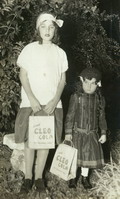 Perhaps, it was during the years that followed Mom�s death, or during W.W.II, that he
became restless in his career, and playing poker and drinking beer with his buddies, he began to think of having his
own business and being the boss. From the many remarks he made at home, it was clear he had little or no respect for
his Masonic Temple member bosses at American Tool Works, who he believed, would never promote him, a Catholic, to
foreman. Perhaps, it was during the years that followed Mom�s death, or during W.W.II, that he
became restless in his career, and playing poker and drinking beer with his buddies, he began to think of having his
own business and being the boss. From the many remarks he made at home, it was clear he had little or no respect for
his Masonic Temple member bosses at American Tool Works, who he believed, would never promote him, a Catholic, to
foreman.
1938: Don and Me on Holloween
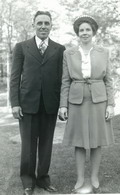 Soon after, Dad married the widow, May Miller. She had three children in the age
range of my older brothers. I was by far the youngest at age eleven. May�s son, Bill also went into the
military. Soon after, Dad married the widow, May Miller. She had three children in the age
range of my older brothers. I was by far the youngest at age eleven. May�s son, Bill also went into the
military.
 Her daughter, Marion, and older son, Bob who was 4-F and could not serve
in the military, lived with Mom, Dad and me at 4936 Glenway Avenue. Her daughter, Marion, and older son, Bob who was 4-F and could not serve
in the military, lived with Mom, Dad and me at 4936 Glenway Avenue.
Ed and May on their wedding day.
Dad wanted a family business. He had the entrepreneurial bent and drive. Dad talked of building,
owning, and operating a business in front of our house on Glenway, perhaps a music store. That seemed exciting. I
played the clarinet. We all loved music. A music store sounded like fun to me, but thankfully, my Mom�s wisdom
prevailed. Mom told him she would lend whatever support she could to his risky venture into business, but wisely
convinced him to stick with what he knew�wood pattern making�and forget the music store idea. Dad listened.
Parkway Products:
I never did understand, nor agree with Dad not including her in the ownership of Parkway. But there were many areas of a financial nature that they chose between the two of them that I did not understand. They both clung to a "his" and "her" separation of certain things.
In 1996, my brothers, Don and Edgar, wrote their memoirs of the history of the Edward Willig family business, Parkway Products, on the occasion of its 50th anniversary. Their memoirs aroused my recollection of many events, especially those that I personally observed or participated in, from 1946 to 1953. Those were the building, fighting-for-survival and foundational years of Parkway-an incredible testimony to hard work, perseverance, the power of prayer, and total dependence on God. I recall Dad's all encompassing focus on the business and his determination that I, like Edgar and Don, would devote my career to Parkway. I did not like working in the shop (from sweeping floors to building wood patterns) or Dad's pressuring me to work there. At times, I felt guilty and disloyal as I maneuvered to avoid working for Dad. I wanted to please him. I wanted him to be proud of me, but I couldn't envision me as a pattern maker or craftsman.
All that Dad, Edgar and Don accomplished was impressive. The three of them, along with Mom (my step-mother, May), were the "co-founders" of Parkway. Among the four there was no business or management knowledge or experience. And now, to see how accomplished, respected and successful they were is very impressive. Take a look at Parkway�s web site http://www.parkwayproducts.com/. From its inception, Parkway�s ownership remained primarily in the Willig family as a privately held corporation with eight or more locations in five states and two in Mexico. The family sold the company in 2006, for a significant amount of money. I am not aware of the details or anything about the buyer.06 I'm not sure how Dad imputed to his three sons his love of God, but the fruits are clear evidence of its presence in all three of us. (�How did you do it, Dad? I wish I could have done it with my children.�) Edgar has consistently and eagerly been ready to answer God's calls, driving for the Little Sisters of the Poor, entertaining the elderly, leading prayers openly with employees and customers, and much more. Don, as President of Parkway, when faced with difficult management decisions, down sales, or challenging projects would throw his hands high up into the sky and "turned it over to the Lord� asking for divine intervention and guidance. He trusts God for wisdom in all he does. While I was in the seventh and eighth grades, Dad would insist I take two streetcars and travel an hour after school to come sweep the shop near Baldwin Piano. He paid me 15 cents per hour. On Saturdays, he would force me to get up. Mom would say �Oh Ed, leave him alone. He doesn't want to work at Parkway." All to no avail. I would reluctantly get up, dress and grab a bite, and then hear a half-hour lecture while driving to work. He would tell me that my priorities were upside down. Then I worked ten hours for $1.00. (I never did figure out why my pay was cut from 15 cents per hour to $1 per day for Saturday pay.) During my summers, he wanted me to work at Parkway. Heat, sweat, wood shavings, black dust from hand-sanding patterns, and the smell of alcohol in the shellac, was not my idea of fun. I maneuvered out of it by getting a job at Phillips Swimming Pool. Then, when school started and the pool closed, he wanted me at Parkway. I wanted to play sports-baseball and basketball. It was a constant battle of wills. He won most of the time.
Dad has never seen me play any sporting event�not baseball or basketball�or seen me as a cheerleader at Purdue, not even tennis at the John Wayne Tennis Club. He sadly wasn�t interested.
That�s the way it was with
My Dad.
That gave birth to the first life-changing event of my life. Dad reasoned that Jim was getting a better education than I. (Dad may not have been formally educated, but he was intelligent and wise.) He was right. So he made me a generous offer and encouraged me to accept. He offered to pay the substantially higher costs over Elder for me to attend St. Xavier High in downtown Cincinnati for my junior and senior years. Ironically, that, as it turned out, was the springboard for me to later check out of Parkway.
After graduation, I went to work full-time at Parkway. I was now promoted to apprentice wood pattern maker. Don was liberated from Dad's micro management by moving into the metal department. Dad stayed exclusively in the wood pattern portion. Edgar managed the office. This was at the 1260 W. Court Street location. I was directly under Dad's tutelage. His training was intermixed with lectures on the foolishness of my fun-seeking lifestyle. If I would lean on his workbench as he gave me instructions he would say, "Stand up! You have your nights mixed up with your days. If you got to bed earlier you wouldn't be so tired. And, get your hands out of your pockets." I can sum-up my life�s entire advice or counsel from My Dad quite simply:
He told me he planned that I would be an equal owner with Edgar, Don, and himself in Parkway. He wanted me in Parkway, but that was not what I wanted. I never discussed that with Don or Edgar. He liked my bright mind and innovative ideas. Dad was a very progressive thinker-quick to incorporate innovations�Formica, gypsum, and plastics. He would seize opportunities and embrace change. He would encourage creativity. Risk was not a barrier; it was his threshold to the future. He often described himself as "progressive." That he was. Dad did not want me to go to college but rather work at Parkway. So, I didn�t go to college the fall after graduation. I continued to work at Parkway. Then another life changing event occurred. The first workday after New Years Day, 1953, I was still in a mental fog from partying the night before�no surprise to Dad. I chose the small lathe for turning a large block of wood (the next size lathe was huge, would take longer to setup and I'd get more wood chips all over me using it. Ugh.) Inadvertently, I put the lathe on its highest speed rather than the slowest. When I turned it on, the wood instantly flew apart, crushing my chest. That knocked-me-out of Parkway in more ways than one. I awakened in the hospital to be flat on my back for five days. On the second day, I asked my girlfriend to write Purdue University, where I had previously been accepted, to find out when I could start. When I got home, Purdue's reply was in the mailbox. I could start in two weeks and to do so I was required to be on campus within ten days. I had saved the money for tuition, room and Board and books, plus a little to spare. I was out of Parkway and done working for my Dad. It was a new beginning. One weekend while at Purdue, three of my buddies and I went to Chicago. When we drove down the Outer Drive and I saw all those lanes of traffic, something I had never ever seen before, I was amazed. That night we ate at the Sheraton Porterhouse Steak House. My steak was as big as would feed my entire family in Cincinnati. WOW! I discovered that there was more to the world than Cincinnati, which I had thought was the center of the universe. I knew then that there was a world out there to see and experience that I had no idea existed. A whole new world was opening up for me, one that did not include Parkway or Cincinnati. I ran out of money before the end of school. When I returned to Cincinnati in June after my freshman year, I was broke. I had used my entire savings to get me through one semester. My grades were good and Dad was impressed. Dad wanted me to continue my college education but to change to the University of Cincinnati and co-op at Parkway. I said I would give it a try and I did that summer. I earned a "B" in Physics and an "A" in English composition at U.C., and worked at Parkway. That pleased him, and he wanted me to finish college at U.C. But, it had now become clear to us both that my future was not to be at Parkway.
Immediately after graduating in January 1958 from Purdue with a B.S. in Mechanical Engineering, I was married in the newly renovated St. Peter in Chains Cathedral. Dad gave me a $10,000 graduation, wedding and get-started gift. Of course, I was overwhelmed. WOW! It raised eyebrows in the family-a clear signal to me to get disconnected from Parkway.
God continued to bless and use Parkway and its owners as conduits of His grace for years to come... to the glory of Our Lord and Savior, Jesus Christ! Dad retired a successful and seasoned business veteran at about age 74, and went home to the Lord in 1983. Edgar is an award-winning, Christian, community leader. Don is an award winning, industry authority and spokesperson. All three are very respected by their peers, employees and customers. And all three have been greatly used by God as model Christian businessmen who proudly wore the mantel of men of God�Christian Statesmen�and were proud to apply their beliefs in all aspects of their lives, personal and business. Their respective individual and collective light continues to bring inspiration to all who know them. They walked, and continue to walk, their talk. I deeply admire them, their accomplishments and what they stand for. This nation would not be in the mess it is today if all business leaders were to emulate their legacy. That's Parkway's fifty-year history; that's Dad, Don's and Edgar's legacy. That's Parkway's legacy.
As its Cincinnati building's cornerstone reads, The story of Parkway is God using those who love Him and who want, more than anything, to please Him and do His will. Parkway was a success because from its conception and everyday of its existence, those who have owned and managed it have held, as their number one priority, to be available to do God's work and give Him all the credit and glory.
The people at Willig Equipment Company loved Dad and he was amazed at their affection. At parties to honor my Dad, he once said to my secretary, �I don�t know what it is that Kenneth does that allows him this extravagance, but whatever it is, keep him doing it.� I had my special men�s store, Mooney Andrews, which sold Louis Roth clothes. During every one of
Dad's visits, I would take Dad there for new suits, sport coats, slacks, shoes, sox, and ties. The manager of the
store would have laid out two or three complete outfits for him in advance. Everything matching. He would go
back to Cincinnati dressed to the hilt. He loved it and I did too.

 One time I took Mom and Dad to visit John Wayne at his home. He greeted them with the typical Wayne
warm hospitality. When he handed his Oscar to Mom she shook with nervousness. He hugged her. Dad held it too. They
were thrilled. Duke was great with them.
Once, at a party at my home in Big Canyon, Duke�s wife, Pilar, was there and when I introduced her to Dad, she kissed him right on the lips. I thought he was going to faint. He could not believe it and talked about it for weeks. 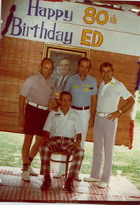
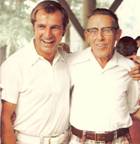 Everybody loved Dad and I loved introducing Dad to everybody. I loved Dad
and was always very proud of him and wanted him to know it. Even to this day, I miss My
Dad. Everybody loved Dad and I loved introducing Dad to everybody. I loved Dad
and was always very proud of him and wanted him to know it. Even to this day, I miss My
Dad.These pictures were taken at Dad�s 80th Birthday Celebration
In 1978, I was invited to give my testimony of how God�s grace had changed my life, to the Cincinnati Bengal�s football team, at their Sunday morning chapel service. While in Cincinnati, I was used as a conduit of God�s grace to pray with my Mom and Dad as they individually invited Jesus Christ to come into their lives as their Lord and Savior. Believe me, it doesn�t get any better than that! I�ll never forget it.
I said � Goodbye� to My Dad on June 24th, 1983. It was a wonderful honor to deliver a eulogy at his memorial celebration. It included this scripture; one that I felt was so perfect for my Dad. �As for me, my life has already been poured out as an offering to God. The time of my death is near.
I have fought a good fight, I have finished the race, and I have remained faithful. And now the prize awaits me�the
crown of righteousness that the Lord, the righteous Judge, will give me on that great day of his return.� Praise God for my Dad. One day My Dad and Me will be reunited again in God�s Kingdom. With love for My Dad, Back to Top |
|
 |
 |
 |



















































 I loved my Dad. He loved me.
Interestingly, the first time either of us told each other was when I was a junior at Purdue University. For some
reason, I had an overwhelming desire to tell Dad. I called him on the phone and among other things, thanked him for
allowing me to go to college (I was the only one in the family) and then said,
I loved my Dad. He loved me.
Interestingly, the first time either of us told each other was when I was a junior at Purdue University. For some
reason, I had an overwhelming desire to tell Dad. I called him on the phone and among other things, thanked him for
allowing me to go to college (I was the only one in the family) and then said,
 I was born in 1934. I have almost no recollection of my mother, Laura. She
died in 1939 before my 5th birthday, Dad found himself in strange territory. He was a worker�a hard worker�a day and
night worker. I was born just after the Great Depression and just before WWII. Times were tough. I always felt
secure because I knew my Dad was there for me, but he was not a man who expressed his feelings demonstratively. He
worked.
I was born in 1934. I have almost no recollection of my mother, Laura. She
died in 1939 before my 5th birthday, Dad found himself in strange territory. He was a worker�a hard worker�a day and
night worker. I was born just after the Great Depression and just before WWII. Times were tough. I always felt
secure because I knew my Dad was there for me, but he was not a man who expressed his feelings demonstratively. He
worked.
 We lived at 4126 W. Liberty Street in Cincinnati in a house he remodeled and added to. He built a
three-car garage, large playhouse and enclosed a front porch, plus made decorative monuments and a table with
benches from rocks, seashells and concrete. He must have built these during the Great Depression when he also
painted houses. He would paint a two-story house for $15 and the owner refused to pay half. He would seek any work
to earn a modest living. As I recall, Dad sold that house in about 1944 for $6,500.
We lived at 4126 W. Liberty Street in Cincinnati in a house he remodeled and added to. He built a
three-car garage, large playhouse and enclosed a front porch, plus made decorative monuments and a table with
benches from rocks, seashells and concrete. He must have built these during the Great Depression when he also
painted houses. He would paint a two-story house for $15 and the owner refused to pay half. He would seek any work
to earn a modest living. As I recall, Dad sold that house in about 1944 for $6,500.  About 1944, during WWII, Dad moved us from 4126 W. Liberty Street to 4936
Glenway Avenue. I believe he paid $9,000 for it. It was a small, two-story, 3 bedrooms, and one bathroom, house. It
was on a heavily traveled arterial (the �Warsaw� streetcar line). There were several small stores just yards away at
Prout's Corner.
About 1944, during WWII, Dad moved us from 4126 W. Liberty Street to 4936
Glenway Avenue. I believe he paid $9,000 for it. It was a small, two-story, 3 bedrooms, and one bathroom, house. It
was on a heavily traveled arterial (the �Warsaw� streetcar line). There were several small stores just yards away at
Prout's Corner. 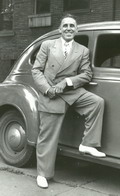 Dad was a religious man�very Catholic. We were a Catholic family. I was raised by the
extended family�aunts, uncles, and housekeepers�no motherly love. Then came May, my new Mom. That was an exciting
new change for me. I welcomed her with a big hug. The first time ever that I experienced unconditional love was in
the 5th grade from my new Mom, May. She took my side in a battle with my 5th grade teacher at St. Teresa School. I
will never forget that expression of her love.
Dad was a religious man�very Catholic. We were a Catholic family. I was raised by the
extended family�aunts, uncles, and housekeepers�no motherly love. Then came May, my new Mom. That was an exciting
new change for me. I welcomed her with a big hug. The first time ever that I experienced unconditional love was in
the 5th grade from my new Mom, May. She took my side in a battle with my 5th grade teacher at St. Teresa School. I
will never forget that expression of her love.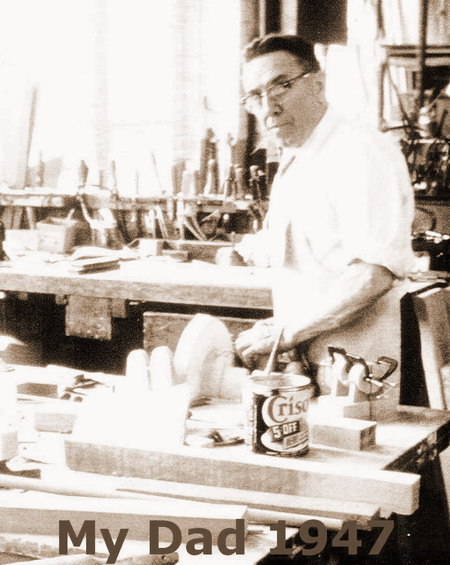 Mom, May, lent Dad all her savings, about $6,500, to help him get started. After he
did, he didn't bring home a paycheck for more than a year. She took care of the home on only the board money from my
four brothers ($10 each per week) and one sister ($5 per week) maybe $45 max per week. The six children plus Dad and
Mom all lived in the tiny three bedrooms (plus a tiny solarium and outside rear porch, both converted into bedrooms)
and one bathroom. Mom did telemarketing to help get business for Parkway. She was instrumental in Parkway's birth
and survival.
Mom, May, lent Dad all her savings, about $6,500, to help him get started. After he
did, he didn't bring home a paycheck for more than a year. She took care of the home on only the board money from my
four brothers ($10 each per week) and one sister ($5 per week) maybe $45 max per week. The six children plus Dad and
Mom all lived in the tiny three bedrooms (plus a tiny solarium and outside rear porch, both converted into bedrooms)
and one bathroom. Mom did telemarketing to help get business for Parkway. She was instrumental in Parkway's birth
and survival. 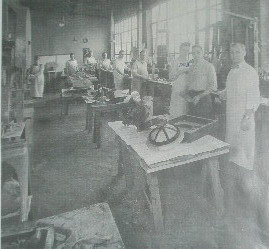 So, in 1946, Dad, a 52-year old craftsman, with little education, no business management or
marketing experience, and very limited capital or credit, started Parkway Products. He insisted on Edgar (an
appliance salesman), Don (a Navy butcher) and me (a seventh grade student) to join him. That's entrepreneurialism.
So, in 1946, Dad, a 52-year old craftsman, with little education, no business management or
marketing experience, and very limited capital or credit, started Parkway Products. He insisted on Edgar (an
appliance salesman), Don (a Navy butcher) and me (a seventh grade student) to join him. That's entrepreneurialism.
 Dad wanted all three of his sons in the business. But I wanted no part of the problems
that would have caused with my brothers. I am strong minded and aggressive. The three of us would never have worked
well together as a team. Ed and Don viewed me as spoiled and headstrong. There is no way they would have been happy
with me in a leadership role and I did not want to make any waves. My heart was not in Parkway and theirs appeared
to be.
Dad wanted all three of his sons in the business. But I wanted no part of the problems
that would have caused with my brothers. I am strong minded and aggressive. The three of us would never have worked
well together as a team. Ed and Don viewed me as spoiled and headstrong. There is no way they would have been happy
with me in a leadership role and I did not want to make any waves. My heart was not in Parkway and theirs appeared
to be.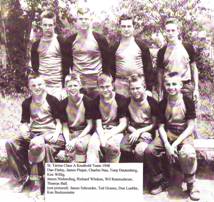
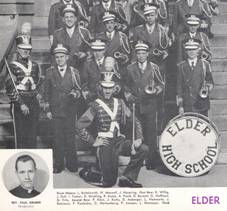 I went to Elder High School, played in the band and worked at Parkway
after school. Another boy working for Parkway, Jim Piper, went to St. Xavier High School. Both Jim and I would ride
home with Dad after work. Dad didn't know much about education, but he knew something was not what it should be when
I never brought books
I went to Elder High School, played in the band and worked at Parkway
after school. Another boy working for Parkway, Jim Piper, went to St. Xavier High School. Both Jim and I would ride
home with Dad after work. Dad didn't know much about education, but he knew something was not what it should be when
I never brought books
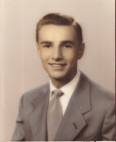 St. Xavier was a college prep school. Dad did not want me to go to
college, but rather work at Parkway. But, in order to graduate from St. Xavier, I had to have been accepted at a
minimum of three major universities. I applied to four (UC, Xavier, Purdue, and Stanford) and was accepted at all,
but had no plans to attend.
St. Xavier was a college prep school. Dad did not want me to go to
college, but rather work at Parkway. But, in order to graduate from St. Xavier, I had to have been accepted at a
minimum of three major universities. I applied to four (UC, Xavier, Purdue, and Stanford) and was accepted at all,
but had no plans to attend. 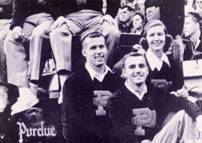 He then generously offered to pay my tuition, room, and board at Purdue to
continue the pursuit of my engineering degree. I eagerly accepted. I don't think I ever worked at Parkway after
that, perhaps only a few days or so during breaks to earn some spending money for school. Summers I worked in the
engineering departments of Clopay and Scheible in Cincinnati.
He then generously offered to pay my tuition, room, and board at Purdue to
continue the pursuit of my engineering degree. I eagerly accepted. I don't think I ever worked at Parkway after
that, perhaps only a few days or so during breaks to earn some spending money for school. Summers I worked in the
engineering departments of Clopay and Scheible in Cincinnati. 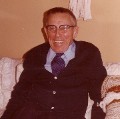 I emphatically requested of Dad that he not include me in any ownership of Parkway or
any share of inheritance. He had done so much for me and it was Don and Edgar who were committed to Parkway, not me.
In certain respects, I was the "prodigal son." He granted my request and the rest is history. Parkway paid for my
college education and a get-started nest egg. Thank you, Dad, Don and Edgar.
I emphatically requested of Dad that he not include me in any ownership of Parkway or
any share of inheritance. He had done so much for me and it was Don and Edgar who were committed to Parkway, not me.
In certain respects, I was the "prodigal son." He granted my request and the rest is history. Parkway paid for my
college education and a get-started nest egg. Thank you, Dad, Don and Edgar.  After graduating from Purdue and following a tour of duty in the Army as a
2nd Lieutenant, I embarked on my career in the heavy construction machinery business. That led to moving to
California where I later started the first of several entrepreneurial ventures, Willig Equipment Company.
After graduating from Purdue and following a tour of duty in the Army as a
2nd Lieutenant, I embarked on my career in the heavy construction machinery business. That led to moving to
California where I later started the first of several entrepreneurial ventures, Willig Equipment Company. As I grew in my successful career, my Dad and I entered into an entirely new
relationship. I would bring Mom and Dad to California to visit once or twice per year. I took them to San Francisco,
Las Vegas, Hawaii, Los Angeles, and Palm Springs. They dined in the best gourmet restaurants and visited all the
major tourist attractions. Dad had taken up swimming on a daily basis, and I had a pool at our home. In Newport
Beach, he would swim at the Balboa Bay Club.
As I grew in my successful career, my Dad and I entered into an entirely new
relationship. I would bring Mom and Dad to California to visit once or twice per year. I took them to San Francisco,
Las Vegas, Hawaii, Los Angeles, and Palm Springs. They dined in the best gourmet restaurants and visited all the
major tourist attractions. Dad had taken up swimming on a daily basis, and I had a pool at our home. In Newport
Beach, he would swim at the Balboa Bay Club. 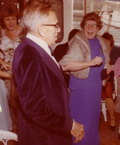
 And in 1980, it was an amazing blessing that Dad and Mom were able to be with Noreen
and me when we were married on October 11th. Edgar and Don, and their wives were there too. That was very, very
special.
And in 1980, it was an amazing blessing that Dad and Mom were able to be with Noreen
and me when we were married on October 11th. Edgar and Don, and their wives were there too. That was very, very
special.